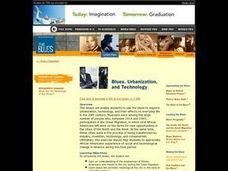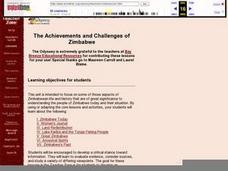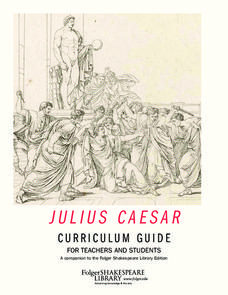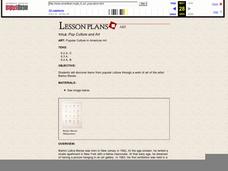Crafting Freedom
George Moses Horton: Slavery from a Poet's Perspective
After reading about the life of George Moses Horton, the first slave to publish anti-slavery poetry, learners will recall his major accomplishments, provide a summary of the obstacles he faced, and identify common aspects of the...
National Endowment for the Humanities
Frances Ellen Watkins Harper’s “Learning to Read”
Frances Ellen Watkins Harper's poem "Learning to Read" is the focus of a lesson that teaches middle schoolers how to do a close reading of a text. The lesson introduces them to a brief biography of the poet, includes a video reading, and...
Curated OER
Social Studies, Music, The Blues, Urbanization, and Technology
Enable students to use the blues to explore urbanization, technology, and their effects on everyday life in the 20th century. Musicians were among the large number of people who, between 1914 and 1945, participated in the Great Migration...
Curated OER
The Achievements and Challenges of Zimbabwe
Here is an excellent set of five short lessons and activities intended to help learners not only gain an understand of current issues in Africa, but build critical thinking, synthesis, analysis, expository writing, research, and...
City University of New York
Jim Crow and the Fight for Civil Rights
The history of voting rights in America has always been rocky, especially in the time period after the Civil War. Learn about the ways that Jim Crow laws affected the voting rights of African Americans with a lesson featuring primary...
US National Archives
Documented Rights Educational Lesson Plan
How have groups struggled to have their unalienable rights recognized in the United States? Acting as a research team for the Human Rights Council of the United Nations, your young historians will break into groups to research how people...
Crafting Freedom
George Moses Horton: Crafting Virtual Freedom Through Poetry
What is "virtual freedom"? How about "enslaved entrepreneurship"? Class members will learn about these terms and much more as they read the poems and examine the life of George Moses Horton.
Crafting Freedom
Man in the Middle: Thomas Day and the Free Black Experience
How did free and enslaved blacks work to craft freedom for themselves and their families before the Civil War? Young historians read about the life of Thomas Day, a free black man who also owned slaves and had abolitionist ties in...
Library of Virginia
Life as a Liberated People
Imagine having no control over your life and then suddenly having to provide for yourself. Such was the challenge faced by many American slaves after emancipation. Class members are asked to consider these challenges are they examine...
Folger Shakespeare Library
Julius Caesar Curriculum Guide
Julius Caesar need not be Greek to kids. The background information and suggestions for teachers, as well as the activities for learners, make this curriculum guide a must-have for your Shakespeare curriculum library.
National Endowment for the Humanities
A Debate Against Slavery
Slavery is a serious topic that can be challenging for middle schoolers to study. Young scholars can see firsthand through primary sources what occurred during that time period in the United States. The third of five lessons provides...
Alabama Department of Archives and History
Alabama's 1901 Constitution: What Was at Stake?
Who should be able to vote? As part of a study of the 1901 Alabama Constitution, class members examine primary source document that reveal the reasons the authors gave to support their positions on this question and their assumptions in...
Middle Tennessee State University
Fights, Freedom, and Fraud: Voting Rights in the Reconstruction Era
As part of a study of post Civil War era, young historians investigate the changes in voting rights during the Reconstruction Era (1863-1876), the fraud involved in the Hayes-Tilden presidential election of 1876, and efforts by Pap...
Defining US
Integration of Education and American Society
How did the struggle for Civil Rights during the 1950s transform American society and politics? Why are American schools integrated today? Class members explore these essential questions by examining a series of primary and secondary...
Smithsonian Institution
Comparing Confederate and Union Soldiers
The Civil War, a war that divided a nation. Comparing and contrasting the Confederate and Union soldiers is not always an easy task, but the eighth of 15 resources makes it easy to teach the concepts. Exercises include watching videos in...
National Park Service
Civil War to Civil Rights: From Pea Ridge to Central High
Explore how the Civil War impacted the Civil Rights Movement. Class members complete a series of projects for a unit that uses a layered curriculum approach to learning.
Alabama Department of Archives and History
Marketing a Bad Idea: Why So Many People Joined the Klan in the 1920s
How did the Klu Klux Klan manage to gain so many members during the 1920s? Class members examine Klan documents and promotional materials to gain an understanding of the propaganda techniques used to attract members.
Curated OER
Pop Culture and Art
Learn about American pop culture, art, and the social voice that art can convey. The class discusses the life and art of Barton Benes, views his piece Reliquarium, then discusses what they see and feel when they view his work. Make sure...
National Endowment for the Humanities
Slavery and the American Founding: The "Inconsistency Not to Be Excused"
High schoolers examine slavery in the revolutionary and colonial eras of the United States. In this slavery lesson, students investigate the presence of slavery in early America, the language of the Constitution, and the intent of the...




















